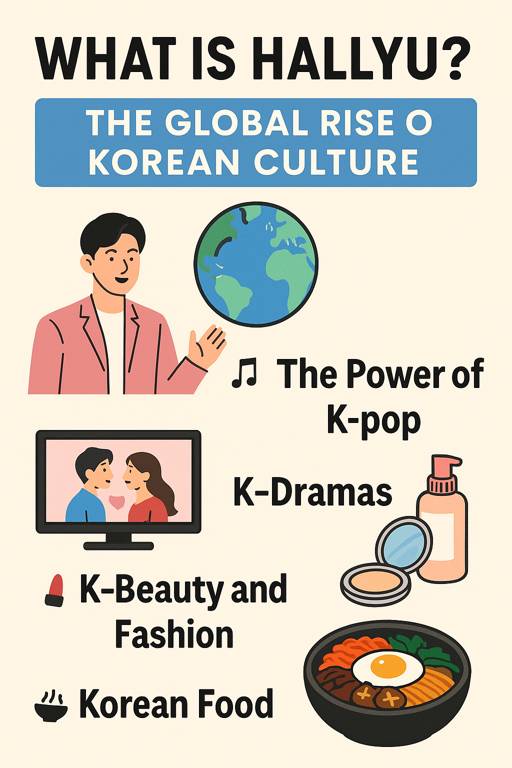Introduction: A Cultural Phenomenon Redefining Global Trends
South Korea has experienced a rapid transformation over the past two decades. It evolved from a relatively small entertainment exporter into a global cultural powerhouse. This extraordinary transformation is known as Hallyu (한류) — the Korean Wave. Hallyu refers to the growing global popularity of South Korean culture. It includes music, television, film, beauty, fashion, food, and even language. But Hallyu is more than just a trend. It’s a soft power movement. This movement has reshaped how the world perceives Asian culture.
1. The Origin of Hallyu: From Regional to Global
The term “Hallyu” was first coined by Chinese journalists in the late 1990s. This happened when Korean dramas like Winter Sonata and Autumn in My Heart began gaining immense popularity across East Asia. They were especially popular in China and Japan. At the time, few could have predicted the eventual reach of this cultural export. It would one day penetrate diverse markets such as the United States, Brazil, France, and Nigeria.
What started as a regional curiosity quickly became a global fascination. The rise of K-pop was led by groups like TVXQ and Super Junior. Later, BTS and BLACKPINK played a significant role. This transformation turned South Korea into a cultural epicenter. It especially influenced younger generations seeking fresh, dynamic content.
2. Key Components of the Korean Wave
K-pop:
With its infectious beats, high-concept music videos, and synchronized choreography, K-pop captivates audiences. It has dedicated fandoms. These elements have made K-pop a central force in spreading Hallyu. Platforms like YouTube, Twitter, and TikTok have allowed global fans to engage directly with artists and content.
K-dramas and Korean Cinema:
Korean television dramas and films have also played a significant role. Series like Crash Landing on You, Squid Game, and Extraordinary Attorney Woo gained massive international audiences. Films like Parasite and Minari earned top honors at the Oscars and Golden Globes.
K-beauty and Fashion:
Hallyu has also revolutionized global beauty and fashion standards. K-beauty is known for its skincare innovation. It emphasizes minimalist makeup. The trend has entered mainstream Western markets. Korean fashion brands are now featured in global fashion weeks.
Food and Lifestyle:
Korean cuisine, such as kimchi, bibimbap, and Korean BBQ, has become widely recognized and appreciated. Even Korean lifestyle elements — from cafe culture to interior design — are now being emulated abroad.
3. The Soft Power of Hallyu
One of the most impactful aspects of Hallyu is its role in soft power diplomacy. South Korea has effectively used its cultural exports to build a positive global image. It has fostered tourism. It influences public perception without military or economic pressure. According to the Korea Foundation, over 180 countries now have active Hallyu fan clubs, comprising millions of members.
Hallyu has also inspired increased interest in the Korean language. Institutions like King Sejong Institute and language apps are witnessing a surge in learners. They are eager to study Hangul (한글).
4. Why Hallyu Resonates Globally
- High production quality: Whether it’s music, film, or television, Korean content is polished, visually compelling, and emotionally resonant.
- Relatable yet unique storytelling: Korean dramas often blend universal themes — love, family, justice — with uniquely Korean perspectives.
- Digital accessibility: The internet and social media have allowed Korean content to reach audiences without borders or traditional media gatekeepers.
- Active fan culture: Hallyu fandoms are not passive viewers but active promoters, translating subtitles, sharing memes, and organizing online events.
Conclusion: Hallyu Is Not Just a Wave — It’s a Movement
Hallyu began as a regional spark but has evolved into a global movement that bridges cultures. It represents South Korea’s identity, creativity, and openness to the world. Hallyu influences global pop culture through catchy K-pop beats. It does so with emotionally rich K-dramas as well. Additionally, it introduces innovative beauty trends. These elements foster meaningful cultural exchange.
As it grows, Hallyu offers a powerful example of cultural impact. When shared authentically, culture can connect people across languages, borders, and beliefs.

답글 남기기